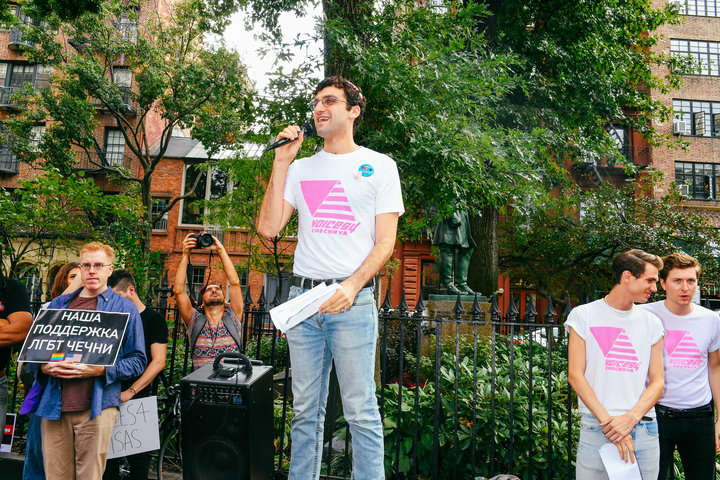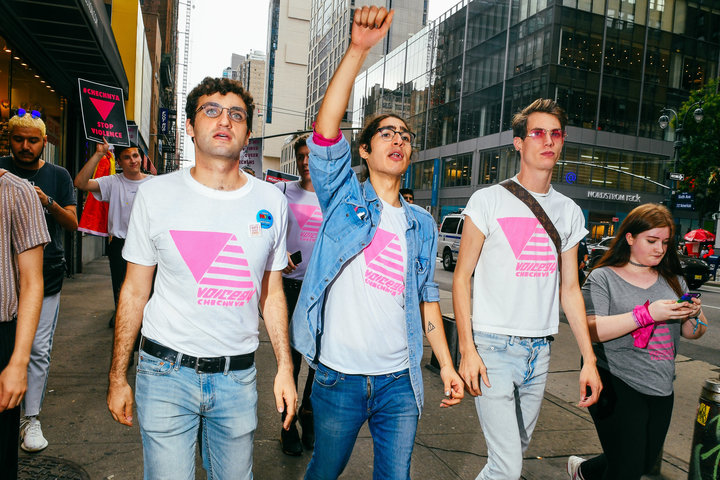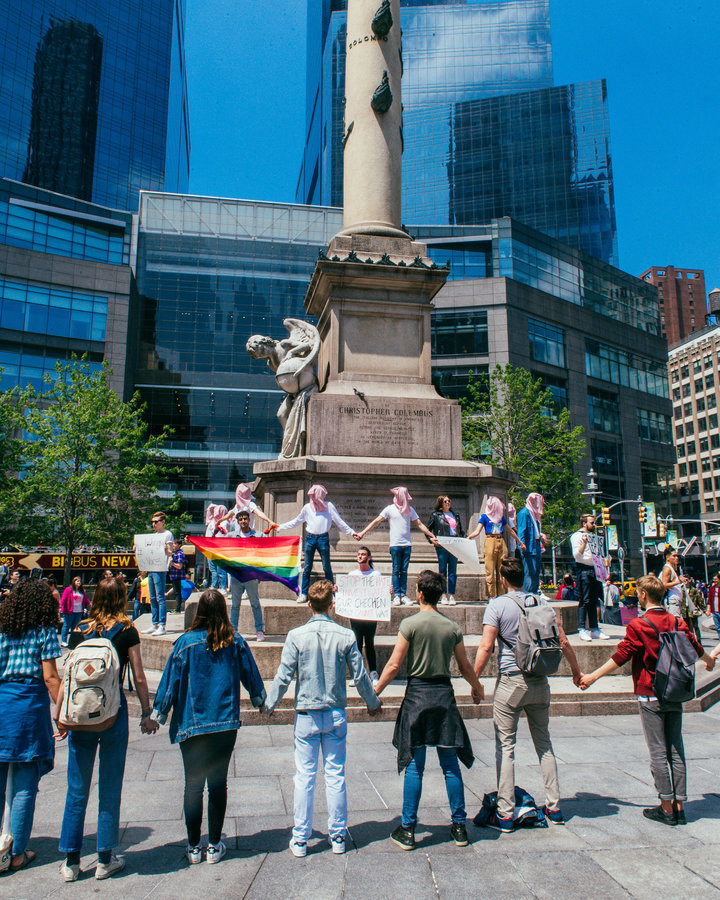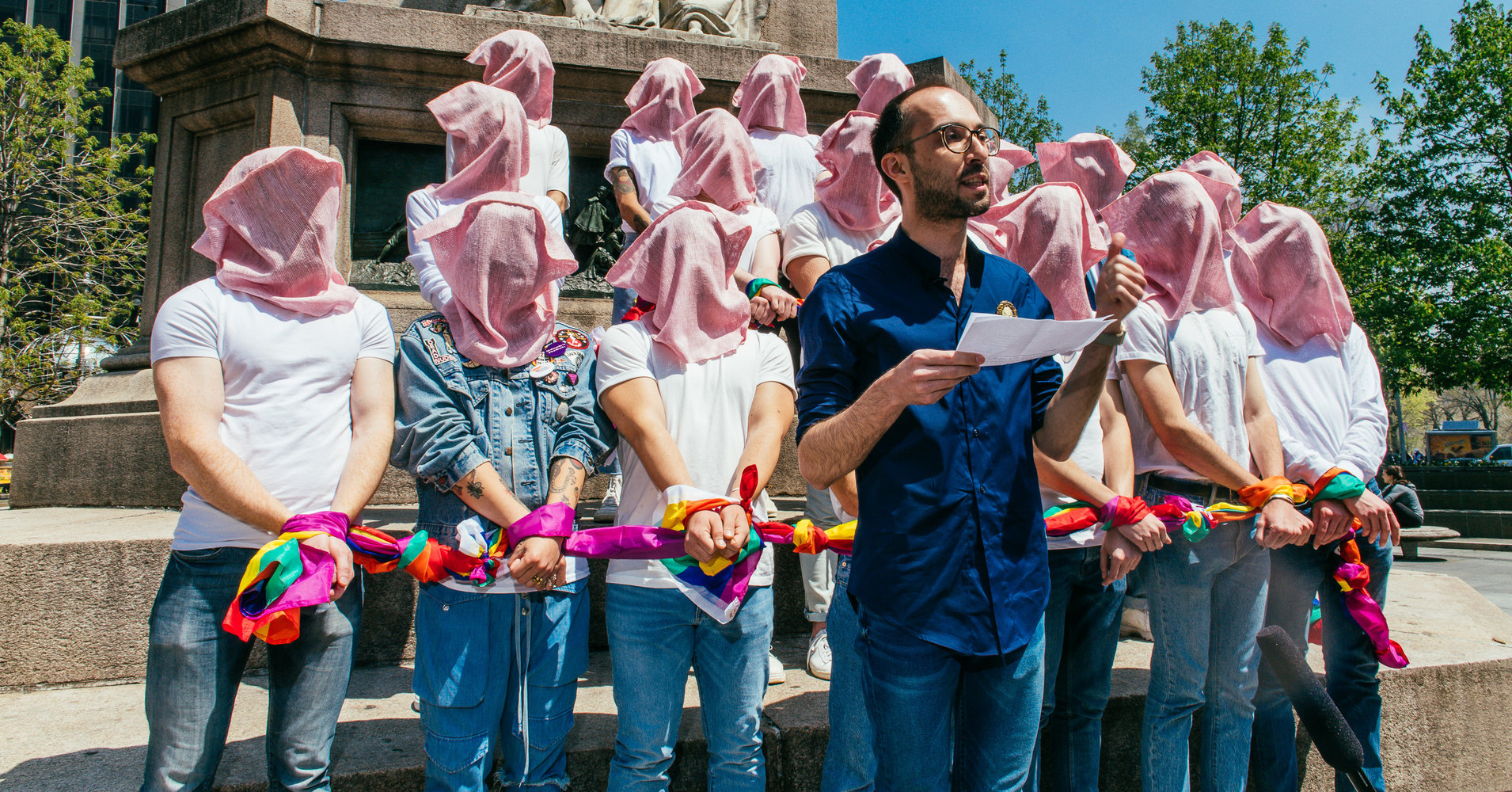[ad_1]
When Adam Eli awoke the morning of June 12, 2016, to the news of the Pulse nightclub massacre, he didn’t know what to do.
Like many other LGBTQ people, he turned to social media to seek refuge, comfort and perspective from his queer brothers, sisters and siblings around the world, each of whom was trying to process the devastating influx of information in their own way.
“I was really sent into shock and I didn’t know what to do with myself and I kept posting [online] about it because I didn’t know what else to do,” Eli, 27, told HuffPost. “Everyone kept asking, ‘What should we do next? What should we do next?’”
When news of a massive vigil outside the historic Stonewall Inn in response to the tragedy started to spread, Eli decided to invite other mourning LGBTQ people who did not want to undergo the experience on their own to join him at the establishment in New York City, where he lives.
“I said, ‘If you’re sad and upset and you don’t want to be alone, you can meet me at this street corner and we can all go to the vigil together.’ Then 30 people showed up and I was like, ‘Oh wow,’” he said.
Following that initial meetup, Eli felt it was important to continue the momentum the queer community had found in taking action together. He joined Gays Against Guns (GAG), an LGBTQ gun control organization that formed in the wake of the Pulse massacre. Several meetings in, he became the group’s social media manager and began learning about the functionality of an activist collective, as well as how to manage one on various social media channels.
Today, Eli runs his own activist collective called Voices4. Initially formed as a response to the abuses gay men are facing in Russia-controlled Chechnya, Voices4 bills itself as “a non-violent advocacy group that is committed to using direct action to achieve global queer liberation.”
These direct actions include high-visibility demonstrations such as kiss-in protests, marches and digital protests through platforms like Grindr.
“We do not give people voices. We just amplify voices that are sometimes not heard,” Eli emphasized.
Eli spoke with HuffPost about the formation of Voices4, the goals of his collective and how Voices4 is part of a rich history of LGBTQ organizing in New York City.

Can you talk to me a bit about Voices 4 and how it came to be? What’s your overall vision for it? How has it grown?
Yeah, absolutely. I grew up really Jewish, and the Judaism is a big part of my identity, and growing up we would always talk about the Holocaust and the idea of “Never again.” When I found out that queer people were being put into holding cells and beaten and raped and extorted and murdered for who they were, a metal plate went off in my head and I knew it was time for me to act.
I decided that I wanted to march from Stonewall to Trump Tower, and I posted about it on Instagram, saying, “If you are interested in joining this fight, please meet me at this place and we’ll have our first planning meeting.” [By the third meeting], it was very obvious that we had something much bigger than a single march planned, so we became a movement and a group.
What kind of work, demonstrations and protests have Voices4 engaged in?
We’re a non-violent, direct-action activist group, and we are inspired directly by ACT UP and Gays Against Guns, so we use non-violent, direct-action activism such as protests, petitioning and demonstrations to call out ideas and social issues. A big thing that we do is we find groups that have voices that are not always listened to and use our tools to leverage their voices.
We work with a lot of immigrants and a lot of refugees and asylum-seekers, and we approach them and say things like, “How can we help?” They’ll say something like, “We’re having this protest on this day. It would be amazing if you could get a bunch of Americans to come and get a bunch of press and social media coverage.” Then we say, “Absolutely.”

So it’s ultimately about helping amplify voices?
Yeah. We do not give people voices. We just amplify voices that are sometimes not heard.
Our big quote at Voices 4 is: “When you mess with one queer, you mess with us all.” If you’re queer, that means I have a responsibility and an obligation to show up for you and to help you, and that’s exactly what we’ll be doing on Brighton Beach Pride.
How do these demonstrations and these moments that you’re organizing build on the history of the ACT UP movement?
We are really inspired by ACT UP. We’re also inspired by Queer Nation. We’re also inspired by Gays Against Guns. We’re inspired by a lot of different groups. The kiss-in is a really good example of that. ACT UP did a variety of successful kiss-ins. … We decided to use that tactic because in our manifesto it says very clearly that we are inspired directly by people from the past, and ACT UP used non-violent, direct-action activism as a way of trying to end the AIDS crisis.
Gays Against Guns is using it to try to end gun violence and promote reasonable gun control laws, and we are using it to try to end homophobia and global queer persecution. We’re doing the same thing, just with different means. We are heavily inspired by them, and we have an internal research team, and the internal research team before the kiss-in made a list of … I made a list with every single kiss-in before, and the list had three things. It had the name and the date, imagery, as well as an article so we could learn about it, to ensure that we were doing it in a way that reflected the way that our ancestors had. Everything about that is super deliberate.
Without ACT UP and Gays Against Guns, Voices4 would not exist.

How do you recommend LGBTQ people who may feel powerless under our current political climate channel their anxieties into action?
People tend to think that getting involved in activism is harder than it might seem, but the hardest part is always taking that jump, taking that leap. If you live in New York and you’ve been wondering if you should come to a Voices4 meeting, just come. Come alone, come with a smile on your face. I promise by the time you leave, you’ll feel empowered and with 20 new friends, and if you live somewhere that’s not New York, call up your local LGBT center and just start.
The easiest thing to do is to just start. Reach out to someone on Instagram who lives near you who you see is engaged in that, and just put your toe in the water. I promise it’s a lot easier than it looks to get involved in.
What does Pride mean to you in 2018?
I love Pride. It’s my favorite holiday. My second favorite holiday is Passover. To me, Pride is used as a measuring stick in which we evaluate, we celebrate how far we’ve come, but we also evaluate how much work we have left to do, and that’s really, really important.
This Pride, I’m going to be marching for all of those who cannot. Pride is a celebration, but it’s also political and a reminder of the work we have to do.
This interview has been edited for clarity and length.
For LGBTQ Pride 2018, HuffPost is highlighting 30 different cultural influencers who have shifted the narrative when it comes to queer issues and whose work has contributed to building a more inclusive and equitable future for us all.
#TheFutureIsQueer is HuffPost’s monthlong celebration of queerness, not just as an identity but as action in the world. Find all of our Pride Month coverage here.
[ad_2]
Source link

